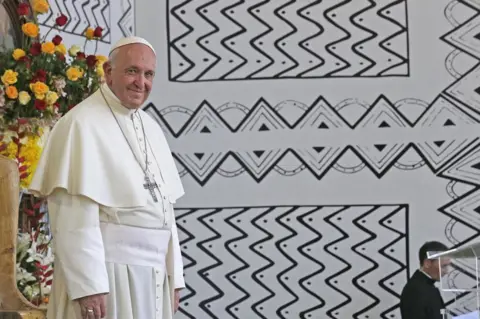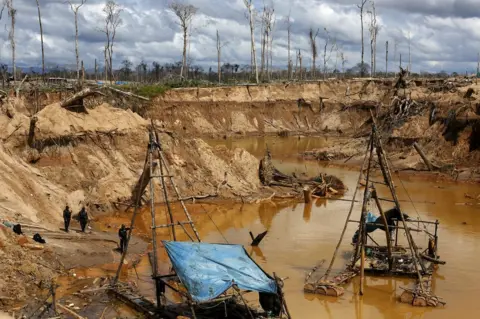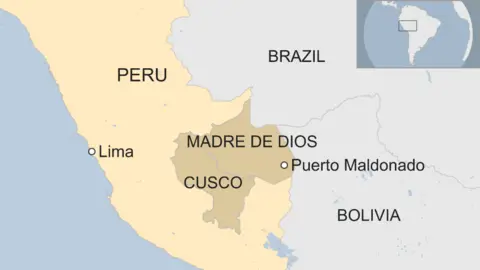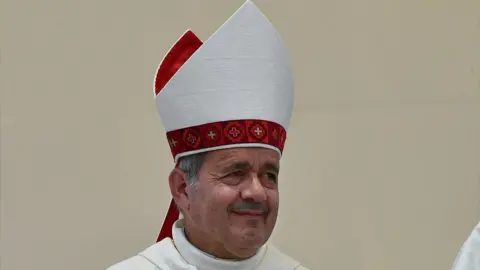Pope Francis warns of threat to Amazon peoples on Peru visit
Pope Francis has used a visit to Peru to sound a stark warning about the pressure on the Amazon and its peoples posed by business interests.
He told indigenous people in the small town of Puerto Maldonado that the region had never been so threatened.
Tribal elders called on him to help protect them, saying they were being driven from their lands.
The pontiff arrived in Peru from Chile, where he became embroiled in a row over clerical sex abuse.
He drew anger by accusing victims of a paedophile priest of slandering a bishop they accuse of trying to cover up the priest's crimes.
The Argentine Pope, 81, is on the second and final leg of a week-long tour of Latin America.
What did the Pope say exactly?
Bare-chested tribesmen, their bodies painted and their heads crowned with colourful feathers, danced and sang for the pontiff in Puerto Maldonado, an AFP news agency correspondent reports.
 EPA
EPAPeople from across the Amazon basin region of Peru, Brazil and Bolivia had travelled in their thousands to meet him.
"The native Amazonian peoples have probably never been so threatened on their own lands as they are at present," Francis said, his speech punctuated by applause and the beating of drums.
"The Amazon is a territory that is being disputed on many fronts. On the one hand, pressure being exerted by great business interests seeking petroleum, gas, lumber, and gold and on the other, the threat against the territories also comes from the perversion of several policies that promote conservation without considering humans.
"Yes, for some, you are considered an obstacle or a disturbance but all of you are the cry to the conscience."
How great is the threat to the Amazon?
 Reuters
Reuters"They enter into our territories without asking us and we suffer a lot and we will die when they drill into our land to retrieve the black metal water," Yesica Patiachi, a Peruvian indigenous representative, told the Pope.
"We will suffer when they poison and spoil our rivers, converted into black water of death. The outsiders see us as weak people and insist in taking away our territory in different ways. If they succeed in taking away our lands we might disappear."

Madre de Dios, the region around Puerto Maldonado, has been blighted in recent years by unregulated gold mining, leading to dangerous levels of mercury in rivers, Reuters news agency reports.
Activists and tribespeople have been attacked by illegal loggers and drug traffickers in other parts of the Peruvian Amazon.
The Camisea gas reserves in the Cusco region are coveted by legal foreign companies.
"We have to break with the historical paradigm that views Amazonia as an inexhaustible source of supplies for other countries without concern for its inhabitants," the Pope added on Friday.
What happened in Chile?
On a visit near the northern city of Iquique, Francis said there was "no proof" for claims that abuse by Father Fernando Karadima had been covered up by Bishop Juan Barros.
One of Karadima's victims, Juan Andres Murillo, responded by saying the Pope's words were unacceptable.
"The Pope called our statements against Bishop Barros's concealments 'slander'," he told AFP.
"As we confirmed with our lawyers, 'slander' is the imputation of a false fact. This is serious and we can't accept that."
 VINCENZO PINTO/AFP/Getty Images
VINCENZO PINTO/AFP/Getty ImagesThe Catholic Church suffered a body blow in Chile in 2010 when Karadima was publicly accused of molesting several teenage boys in the capital, Santiago, starting in the 1980s.
In 2011 the Vatican found him guilty and sentenced him to a lifetime of "penance and prayer".
He never faced criminal prosecution in Chile as too much time had passed, but the judge who heard victims' testimony in a year-long investigation described them as "truthful and reliable".
